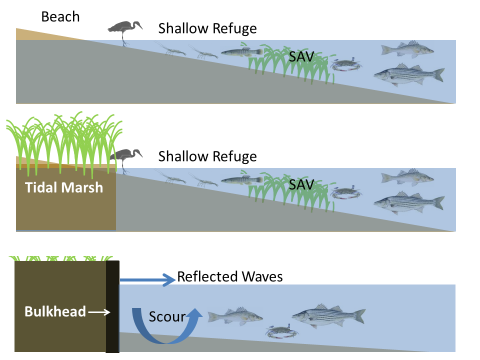Coastal population growth and a desire to guard against sea level rise and coastal erosion has led to extensive conversions of natural wetlands and beaches to bulkheads and riprap. A new NCCOS-funded study recently published in Estuaries and Coasts explores how these changes are affecting fish and crustaceans in nearshore areas of Chesapeake Bay.

Across all species, small fish (≤60 mm, or 2.4 in) were most abundant near wetlands and beaches, while large fish (>100 mm, or 3.9 in) were most abundant at hardened shorelines. Shallow water can provide refuge from predators, making this habitat important to the survival of small fish, including juveniles of larger species.
Very close to shore, water was deeper near hardened shorelines, which allowed larger fish to occupy these areas. Smaller fish either avoided deeper hardened shorelines, or were driven out or eaten by larger fish. In addition to harboring smaller fish, natural shorelines showed a greater variety of species, suggesting that shoreline hardening that comes at the expense of natural habitat likely reduces overall estuarine production.
For more information, contact Elizabeth.Turner@noaa.gov.
